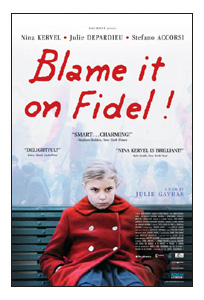
BLAME IT ON FIDEL
France, 2006, 99 minutes, Colour.
Nina Kervel- Bey, Julie Depardieu, Stephano Accorsi, Benjamin Feuillet.
Directed by Julie Gavras.
Julie Gavras is the daughter of celebrated director, Costa Gavras. Costa Gavras’ films of the 1960s and 1970s were impassioned political films, critical of oppressive regimes. He won an Oscar for Z and made The Confession, Section Speciale as well as Missing. His daughter seems to be following in his footsteps with this political film, albeit a far more domestic and gentle film than those of her father.
Based on an Italian novel, Tutta Colpa a Fidel by Domitalla Calamai, this is a portrait of a young girl in 1970-71, Anna. Her French mother (Julie Depardieu) has married a Spaniard (Stefano Accorsi) from a well-to-do Franco-supporting family. However, his sister has been actively involved in politics, and her brother, feeling guilty, becomes involved himself, especially for Chileans in France, supporters of Allende. They give up their bourgeois home and wealth, have a stream of refugees and dissidents in their small house, while the mother interviews women, especially concerning pregnancy and abortion, for a book.
Anna, used to finer things and good manners, is appalled. She cannot understand it. Sent to a Catholic school for a better education, she is forbidden by her father to go to catechism classes. A succession of foreign nannies – and their food – dismay her and she is bewildered by her change of fortune and, being a very strong character, she rebels. Her younger brother, however, has no difficulty adapting (and is always hungry and enjoying his food). Gradually, Anna comes to terms with change. She has a very enquiring mind, forever asking questions of her parents, the visitors in the house and her teachers. She learns about human solidarity, the uncertainty of certainty, the love of her parents – and is prepared to be a questioner in life.
Nina Kervel- Bey is an impressive little girl and brings Anna alive. Benjamin Feuillet as her brother, Francois, is a scene stealer.
The screenplay assumes that the left-thinking parents are in the right – and the film makes its case for seeing bourgeois traditions as selfish and greedy.
1.Political cinema? French, left-wing? The background of Chile in the 1970s?
2.A domestic drama, the 70s, transition period, the wider world? The background of Franco’s fascism? Allende in Chile? Refugees? Women’s issues, poverty, pregnancy, abortion?
3.The Paris settings, the mansion, the lifestyle, the transition to the apartment, life in the apartment, school? The musical score?
4.The title – and the leftist leanings? The ironic touch?
5.The film from Anna’s point of view, the opening, cutting the fruit, good manners, Anna and her friends, the grandparents and their ideas, the nanny? Ideological views? The views of the rich? Her relationship with Francois? With her parents? The change, her not understanding? A strong character, pouting, at school, moody, with Cecilia? Her father taking her out of the catechism classes and the response? The clashes, the questions? The loss of privilege, her yearning for the comfortable life, growing to understand and accept, the contact with the refugees, the socialist views? The different kinds of food, Asian food? Cecilia’s negative reactions and her response?
6.Anna’s relationship to her parents, the father, his change, mother, bringing her complaints to her? Her mother doing the interviews? Her mother’s exasperation? Yet the bonds between them?
7.The nannies, the different backgrounds, their care, the different food, Vietnamese food?
8.Cecilia as a mirror image of what Anna was like? Their friendship, clashes, change of heart?
9.Francois, his age, always hungry, Anna and her domination, bullying him?
10.The refugees, their talk, listening to Anna, her absorbing their views?
11.The Chilean background, Allende, his victory? The news of his death? His final message and exhortation?
12.The portrait of the father, busy, commitment, his sister and her husband and their work for the revolution? The dangers? His taking Anna to visit his ancestral home? The mother, nice, the range of interviews, the problems of the women? The magazine? Her book?
13.The film urging a change of consciousness, a film against complacency? Social concern?